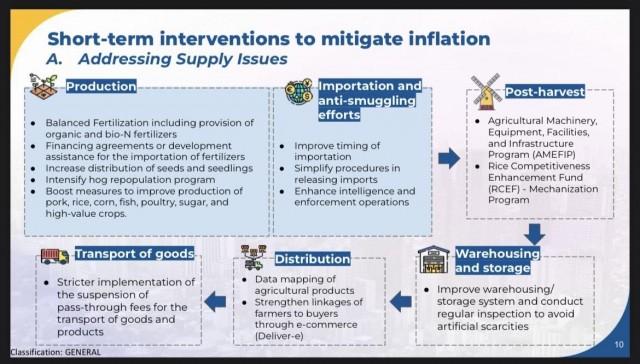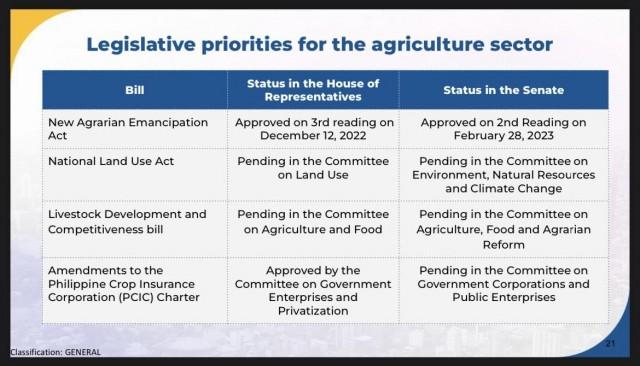DOF's Diokno: Marcos to form permanent inflation, market outlook panel
President Ferdinand Marcos Jr. is forming a permanent inter-agency committee to address the still lingering elevated inflation, Finance Secretary Benjamin Diokno said Tuesday.
At a Palace briefing, Diokno said the high-level inter-agency committee will serve as an “early warning system” for demand and supply situations to address price and supply shocks.
“Kailangan ng early warning systems so magkakaroon ng isa komite na finorm ng Presidente na chair ako at co-chair ko si Secretary [Arsenio] Balisacan, NEDA; vice chairman si DBM (Department of Budget and Management) Secretary si Mina [Pangandaman], and then member nung ang Agriculture, DTI (Department of Trade and Industry) at member din ang DILG (Department of the Interior and Local Government) at saka ‘yung DOST (Department of Science and Technology),” the Finance chief said.
(We need early warning systems, so there will be a committee formed by the President which I will chair and be co-chaired by Secretary Balisacan of NEDA, vice chairman will be DBM Secretary Mina, and then the members are Agriculture, DTI, DILG, and DOST.)
He said the committee would be called the Inter-agency Committee on Inflation and Market Outlook.
“Ang trabaho nito is to come up with a demand and supply situation, and we will report to the President on a monthly basis kung ano ang sitwasyon, kung kailangan mag angkat, magaangkat tayo. So hindi na ad hoc ang desisyon kung kailangan mag import,” Diokno said.
(The job of this is to come up with a demand and supply situation, and we will report to the President every month what the situation is; and if there is a need to import, we will import. So, the decision to import will no longer be ad hoc.)
“This will be a permanent committee,” he said.
The Finance chief explained that currently, the government forms ad hoc committees to import in response to supply and demand requirements.
“Minsan mali ‘yung timing kasi magdedesisyon ka mag-import tapos darating dito sa atin eh tamang tama nag aani na ang mga farmers so umaangal talaga sila,” Diokno said.
(Sometimes the decision to import comes at the wrong time because it will arrive at a time when the farmers are already harvesting so they’re complaining.)
“So dapat talaga ifo-forecast mo (this should be forecasted), there should be a scientific, science-based forecast,” he said.
Diokno said the committee will use satellite technology to forecast production as well as the impact of natural disasters on farm produce.
“Madali naman mag-forecast ng production, gamitin mo ang satellite, para makita mo na ‘pag nagtanim pa lang malalaman mo how many hectares have been planted. So nakikita mo ang development. Tapos kung magkaroon ng bagyo makikita mo rin thru satellite."
(It will be easy to forecast production, using satellites, to see how many hectares have been planted. So, we can see the development. Then if there will be a typhoon, we can also see it thru satellite.)
“So, we will use that kind of model to forecast," he said.
The Finance chief made the announcement after the release of the February 2023 inflation data.
Last month, the inflation rate clocked in at a slightly slower 8.6%, compared to the 8.7% rate recorded in January amid the slower movement in transportation and fuel costs.
Interventions
Diokno, the chief economic manager of the Marcos administration, said he presented to the President short-term and long-term interventions to address inflation.

The short-term interventions involve addressing supply issues such as boosting local production of agricultural inputs, importation if there is a supply deficit, post-harvest facilities, warehousing, distribution, and transportation of goods.
“Kailangan tayo mag angkat ng fertilizers sa ibang bansa kasi kailangan natin ‘yan for agricultural production,” Diokno said.
(We need to import fertilizers from other countries because we need them for agricultural production.)
The Finance chief said the government is in discussions with Saudi Arabia and China for assistance on fertilizer imports.
The Cabinet official also proposed the removal of certificate of necessity to import for fish, digitalize and centralize the sanitary and phytosanitary import clearance system, implement the equivalence principle of the sanitary and phytosanitary agreement, and remover the required authority to release imported goods on fertilizers and feeds ingredients.
Diokno said such proposals would fast-track the release of imported agricultural goods.
“May mga requirements kasi na nakakadelay ng paglabas ng produkto.. pag nag angkat ka bago mo mailabas sa customs maraming mga kailangang mga requirements so these are again part of the recommendation,” he said.
He also proposed the creation of an agricultural monitoring dashboard, implementation of the Farmers and Fisherfolk Enterprise Development Information System to determine supply and distribution areas of enterprises, reconstitution of local price coordinating councils, institutionalization of the sub-task group on economic intelligence, and continuous monitoring of the suspension of pass-through fees.
“We will create an Economic Development Group for faster addressing of the problems of our economy,” Diokno said.
“I will be the chairman, co chair ko si NEDA and the members will be PMS (Presidential Management Staff), DTI, DBM, DA, DPWH, DOTR, DICT, DOE, DOST, DOTR, DILG and DOLE. The Secretariat will be NEDA,” he said.
For long-term solutions, the economic team has identified priority legislative measures, Diokno said.

“For example the New Agrarian Emancipation Act. I understand this has passed the House, napasa na rin ito sa Senado, ang pakay ng batas na ito ay condonation of agrarian reform beneficiaries, worth P58 billion. So mga pagkakautang ng mga small farmers icocondone siya. This will allow farmers to focus now in their efforts to increase production rather than iniisip nila paano ko babayaran ang lupa na ito,” he said.
“The other bill that we are going to push is the National Land Use Act. Ibig sabihin nito maga-alocate tayo ng mga lupa saved for protection, for conservation for production, means for agriculture and fisheries, settlement development for housing and then infra development for transportation, communication, water resources and social infrastructure. So ang mangyayari nito hindi muna, yung mga agri land, kinoconvert to housing so naka set aside talaga 'yung agri land, so they will not be converted to other use,” he added.
Diokno said they also proposed the Livestock Development and Competitiveness bill and amendments to the Philippine Crop Insurance Corporation charter. — DVM/VBL, GMA Integrated News



